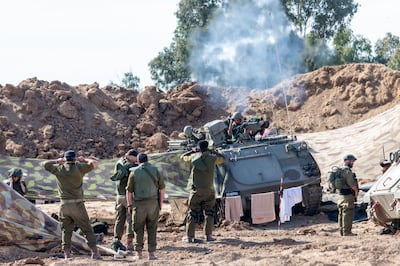Live updates: Follow the latest news on Israel-Gaza
Israel and Hezbollah exchanged gunfire and shells on the Lebanese border yesterday leaving five militants dead and stoking fears of a new front, amid warnings from Jordan's king that the conflict could spiral out of control.
The fighting – the heaviest in years – was sparked when a group of fighters tried to cross the border fence into northern Israel, the military said.
Later, anti-tank missiles were launched against Israeli forces in two locations and Israeli tanks and artillery retaliated.
Two reservists and a civilian were injured in one of the attacks. Later, as sirens sounded in the nearly-empty Israeli town of Kiryat Shmona, rockets were fired from Hezbollah positions.
Travelling throughout southern Lebanon on Tuesday, journalists from The National could hear several explosions.
Lebanese state media said Israel used white phosphorous, which can set people and structures on fire, to clear villages and valleys. Footage and images showed white smoke or gas drifting across a valley in southern Lebanon.

In Gaza on Tuesday, the death toll rose to 3,000 people with more than 12,000 injured.
Last night, at least six people were killed when a UN school housing displaced people was struck by an Israeli air strike in Gaza's Al Maghazi refugee camp. Dozens were injured.
The UNRWA's commissioner-general Philippe Lazzarini called the incident "outrageous" and a "flagrant disregard" for civilian lives.
“At least 4,000 people have taken refuge in this UNRWA school turned shelter. They had and still have nowhere else to go."
The UN agency provides the co-ordinates of its facilities to the warring parties on a daily basis, he said.
In Berlin on Tuesday, King Abdullah II of Jordan said the conflict leaves the whole region in danger of “falling into the abyss”.
After talks with Chancellor Olaf Scholz in Berlin, the king said the “extremely tragic and dangerous situation” in Gaza would “get much worse unless we stop this war and the human catastrophe it is creating”.
He further against trying to push Palestinian refugees into Egypt or Jordan, adding that the humanitarian situation must to be dealt with inside Gaza and the West Bank.
"That is a red line. No refugees in Jordan, no refugees in Egypt."
Shortly after he returned to Amman, King Abdullah held a meeting with military and civilian officials at the army headquarters to discuss the Gaza war.
He told them "Jordan will protect its borders and support the resilience of the Palestinian people on its land”, official state TV reported.
US President Joe Biden will visit Israel on Wednesday to show support for its war on Hamas.
He is then due to visit Amman for a meeting with King Abdullah and Egyptian President Abdel Fattah El Sisi.
Scores of trucks carrying vital supplies for Gaza headed towards the Rafah crossing in Egypt on Tuesday, the only access point to the coastal enclave outside Israel's control, but there was no clear indication that they would be able to enter.
Israel has vowed to annihilate the Hamas movement that controls Gaza after Hamas gunmen killed 1,300 people, mainly civilians, during a rampage through southern Israeli towns on October 7 — the deadliest single day in Israel's 75-year history.
Israel has pummelled the Gaza Strip with air strikes that have killed more than 3,000 Palestinians, a quarter of them children, and driven around half of the 2.3 million Gazans from their homes. It has imposed a total blockade on the enclave, halting food, fuel and medical supplies, which are rapidly running out.
An imminent ground invasion is expected as fears grow that a so-called second front could open up and see the conflict expand.
Hezbollah and Israel last fought a full-on war in 2006, in a deadly month-long conflict that killed more than 1,000 in Lebanon and saw big chunks of the country flattened.
The Lebanese government has issued its full support for the Palestinian people, while also insisting it does not want the economically ravaged country to be dragged into a conflict it can ill afford.
But Hezbollah, believed to be more powerful than the Lebanese army, operates almost as it wishes.
Rules of engagement 'crystal clear'
Lebanese Foreign Minister Abdallah Bou Habib, speaking in Beirut alongside his visiting Turkish counterpart Hakan Fidan, said Israeli attacks in southern Lebanon were "pouring oil on the fire".
He said they were "generating tension that could lead to the front igniting in a way that is hard to contain".
Israel has said it has no interest in waging a war with Hezbollah, while also readying itself for conflict on the northern border.
Most civilians on both sides of the border have evacuated the region amid fears of a conflict.
"Lebanon should be asking themselves if they want to risk their future for Hamas," Israeli Lt Col Richard Hecht said.
"There's still a certain threshold but if this escalates, Lebanon have to ask themselves that very, very hard question.
"And again, our rules of engagement right now on the border are crystal clear. Anyone who will come near the fence or try to deal with the fence in the north will be stopped, they'll be shot," he added.
